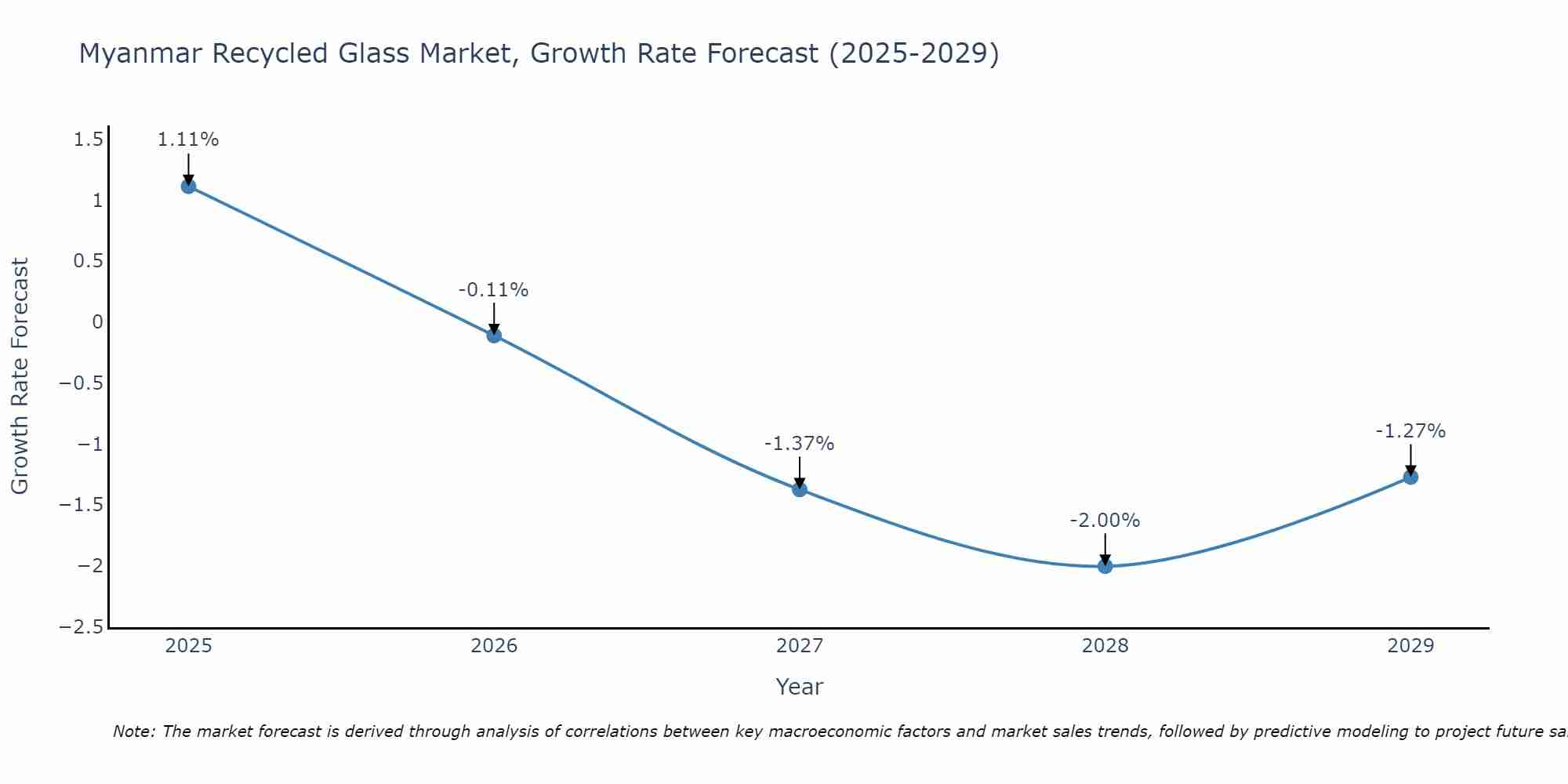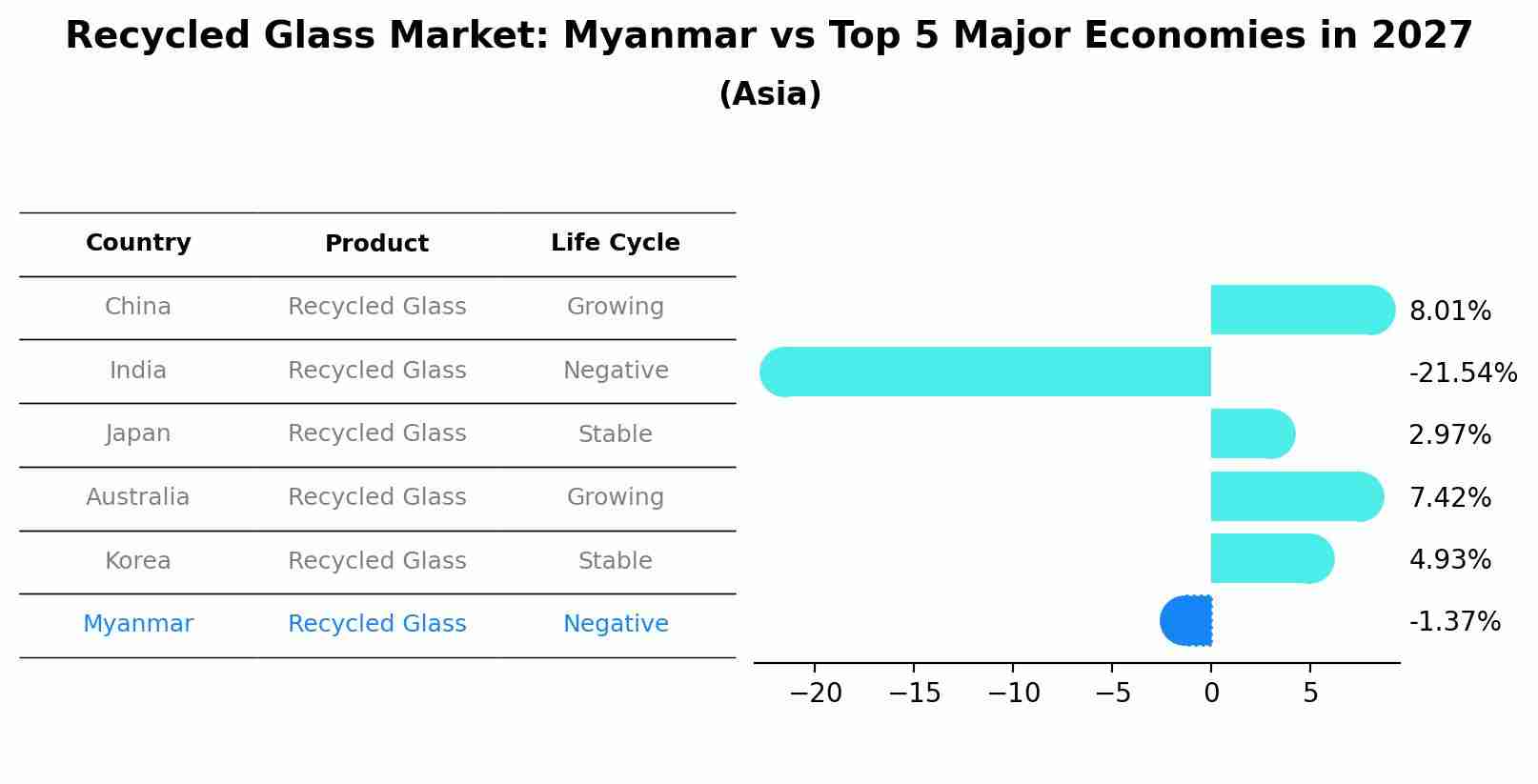Myanmar Recycled Glass Market Outlook | Analysis, Value, Share, Forecast, Size, Growth, COVID-19 IMPACT, Companies, Revenue, Industry & Trends
| Product Code: ETC355714 | Publication Date: Aug 2022 | Updated Date: Aug 2025 | Product Type: Market Research Report | |
| Publisher: 6Wresearch | Author: Sachin Kumar Rai | No. of Pages: 75 | No. of Figures: 35 | No. of Tables: 20 |
Myanmar Recycled Glass Market Size Growth Rate
The Myanmar Recycled Glass Market is projected to witness mixed growth rate patterns during 2025 to 2029. Starting high at 1.11% in 2025, the market steadily declines to -1.27% by 2029.

Recycled Glass Market: Myanmar vs Top 5 Major Economies in 2027 (Asia)
The Recycled Glass market in Myanmar is projected to grow at a negative growth rate of -1.37% by 2027, within the Asia region led by China, along with other countries like India, Japan, Australia and South Korea, collectively shaping a dynamic and evolving market environment driven by innovation and increasing adoption of emerging technologies.

Myanmar Recycled Glass Market Synopsis
The Myanmar recycled glass market is experiencing growth due to increased awareness of environmental sustainability and waste management practices. The demand for recycled glass products is on the rise as consumers and businesses seek eco-friendly alternatives. The market is driven by factors such as government initiatives promoting recycling, the presence of recycling facilities, and a growing number of manufacturers incorporating recycled glass into their products. Key players in the market are focusing on innovation and product differentiation to capture a larger market share. However, challenges such as limited collection infrastructure and lack of awareness among consumers about the benefits of recycled glass hinder the market`s full potential. Overall, the Myanmar recycled glass market shows promise for further expansion as sustainability becomes a key focus in the country.
Myanmar Recycled Glass Market Trends
The Myanmar recycled glass market is experiencing a growing demand due to increasing awareness about environmental sustainability and the benefits of using recycled materials. Consumers and businesses are increasingly choosing recycled glass products over traditional options due to their eco-friendly properties. The government`s initiatives to promote recycling and reduce waste are also driving the market growth. Additionally, the trend of upcycling and repurposing glass materials for home decor and construction purposes is gaining popularity among the urban population. With a focus on reducing carbon footprint and waste generation, the Myanmar recycled glass market is expected to continue its upward trajectory in the coming years.
Myanmar Recycled Glass Market Challenges
The Myanmar Recycled Glass Market faces several challenges including lack of awareness among consumers about the benefits of using recycled glass products, limited infrastructure for collection and processing of glass waste, and the presence of cheaper alternatives such as plastic containers. Additionally, there is a need for more stringent regulations and enforcement to promote recycling practices and reduce environmental impact. Lack of government support and investment in recycling facilities also hinders the growth of the recycled glass market in Myanmar. Overcoming these challenges will require collaborative efforts from government, industry stakeholders, and consumers to increase recycling rates, create demand for recycled glass products, and improve overall sustainability in the country.
Myanmar Recycled Glass Market Investment Opportunities
The Myanmar Recycled Glass Market presents promising investment opportunities due to the increasing awareness of environmental sustainability and the growing demand for eco-friendly products. Investing in glass recycling facilities or partnering with existing glass recycling companies in Myanmar could be lucrative. With the government`s emphasis on promoting recycling initiatives and reducing waste, there is a favorable regulatory environment for such investments. Additionally, the construction industry in Myanmar is a significant consumer of glass products, creating a stable demand for recycled glass materials. By tapping into this market, investors can not only capitalize on the country`s sustainable development goals but also contribute to the circular economy and potentially achieve long-term financial returns.
Jordan Agar Market Government Policies
The Myanmar government has been actively promoting sustainable practices in the country, including initiatives to support the recycled glass market. The Ministry of Natural Resources and Environmental Conservation has implemented policies to encourage the recycling and reuse of glass materials to reduce waste and conserve resources. These policies include providing incentives for businesses and individuals to recycle glass, promoting awareness about the benefits of using recycled glass products, and establishing regulations to ensure proper waste management practices. Additionally, the government has collaborated with industry stakeholders to develop a sustainable supply chain for recycled glass, aiming to boost the market for environmentally-friendly glass products in Myanmar.
Myanmar Recycled Glass Market Future Outlook
The future outlook for the Myanmar Recycled Glass Market appears promising due to increasing environmental awareness and sustainability efforts in the country. With a growing emphasis on reducing waste and promoting recycling, there is a rising demand for eco-friendly products such as recycled glass. Additionally, government initiatives to promote recycling and reduce the environmental impact of glass production are likely to further drive market growth. The construction industry, in particular, is expected to be a key driver for the recycled glass market in Myanmar, as it offers a sustainable alternative to traditional materials. Overall, the market is projected to experience steady growth in the coming years as consumers and businesses increasingly prioritize sustainability in their purchasing decisions.
Key Highlights of the Report:
- Myanmar Recycled Glass Market Outlook
- Market Size of Myanmar Recycled Glass Market, 2021
- Forecast of Myanmar Recycled Glass Market, 2031
- Historical Data and Forecast of Myanmar Recycled Glass Revenues & Volume for the Period 2018 - 2031
- Myanmar Recycled Glass Market Trend Evolution
- Myanmar Recycled Glass Market Drivers and Challenges
- Myanmar Recycled Glass Price Trends
- Myanmar Recycled Glass Porter's Five Forces
- Myanmar Recycled Glass Industry Life Cycle
- Historical Data and Forecast of Myanmar Recycled Glass Market Revenues & Volume By Product for the Period 2018 - 2031
- Historical Data and Forecast of Myanmar Recycled Glass Market Revenues & Volume By Crushed Glass for the Period 2018 - 2031
- Historical Data and Forecast of Myanmar Recycled Glass Market Revenues & Volume By Cullets for the Period 2018 - 2031
- Historical Data and Forecast of Myanmar Recycled Glass Market Revenues & Volume By Glass Powder for the Period 2018 - 2031
- Historical Data and Forecast of Myanmar Recycled Glass Market Revenues & Volume By Application for the Period 2018 - 2031
- Historical Data and Forecast of Myanmar Recycled Glass Market Revenues & Volume By Glass Bottle & Containers for the Period 2018 - 2031
- Historical Data and Forecast of Myanmar Recycled Glass Market Revenues & Volume By Flat Glass for the Period 2018 - 2031
- Historical Data and Forecast of Myanmar Recycled Glass Market Revenues & Volume By Fiber Glass for the Period 2018 - 2031
- Historical Data and Forecast of Myanmar Recycled Glass Market Revenues & Volume By Highway Beads for the Period 2018 - 2031
- Historical Data and Forecast of Myanmar Recycled Glass Market Revenues & Volume By Abrasives for the Period 2018 - 2031
- Historical Data and Forecast of Myanmar Recycled Glass Market Revenues & Volume By Fillers for the Period 2018 - 2031
- Historical Data and Forecast of Myanmar Recycled Glass Market Revenues & Volume By Others for the Period 2018 - 2031
- Myanmar Recycled Glass Import Export Trade Statistics
- Market Opportunity Assessment By Product
- Market Opportunity Assessment By Application
- Myanmar Recycled Glass Top Companies Market Share
- Myanmar Recycled Glass Competitive Benchmarking By Technical and Operational Parameters
- Myanmar Recycled Glass Company Profiles
- Myanmar Recycled Glass Key Strategic Recommendations
Frequently Asked Questions About the Market Study (FAQs):
- Single User License$ 1,995
- Department License$ 2,400
- Site License$ 3,120
- Global License$ 3,795
Search
Related Reports
- ASEAN and Thailand Brain Health Supplements Market (2025-2031) | Strategy, Consumer Insights, Analysis, Investment Trends, Opportunities, Growth, Size, Share, Industry, Revenue, Segments, Value, Segmentation, Supply, Forecast, Restraints, Outlook, Competition, Drivers, Trends, Demand, Pricing Analysis, Competitive, Strategic Insights, Companies, Challenges
- ASEAN Bearings Market (2025-2031) | Strategy, Consumer Insights, Analysis, Investment Trends, Opportunities, Growth, Size, Share, Industry, Revenue, Segments, Value, Segmentation, Supply, Forecast, Restraints, Outlook, Competition, Drivers, Trends, Demand, Pricing Analysis, Competitive, Strategic Insights, Companies, Challenges
- Europe Flooring Market (2025-2031) | Outlook, Share, Industry, Trends, Forecast, Companies, Revenue, Size, Analysis, Growth & Value
- Saudi Arabia Manlift Market (2025-2031) | Outlook, Size, Growth, Trends, Companies, Industry, Revenue, Value, Share, Forecast & Analysis
- Uganda Excavator, Crane, and Wheel Loaders Market (2025-2031) | Strategy, Consumer Insights, Analysis, Investment Trends, Opportunities, Growth, Size, Share, Industry, Revenue, Segments, Value, Segmentation, Supply, Forecast, Restraints, Outlook, Competition, Drivers, Trends, Demand, Pricing Analysis, Competitive, Strategic Insights, Companies, Challenges
- Rwanda Excavator, Crane, and Wheel Loaders Market (2025-2031) | Strategy, Consumer Insights, Analysis, Investment Trends, Opportunities, Growth, Size, Share, Industry, Revenue, Segments, Value, Segmentation, Supply, Forecast, Restraints, Outlook, Competition, Drivers, Trends, Demand, Pricing Analysis, Competitive, Strategic Insights, Companies, Challenges
- Kenya Excavator, Crane, and Wheel Loaders Market (2025-2031) | Strategy, Consumer Insights, Analysis, Investment Trends, Opportunities, Growth, Size, Share, Industry, Revenue, Segments, Value, Segmentation, Supply, Forecast, Restraints, Outlook, Competition, Drivers, Trends, Demand, Pricing Analysis, Competitive, Strategic Insights, Companies, Challenges
- Angola Excavator, Crane, and Wheel Loaders Market (2025-2031) | Strategy, Consumer Insights, Analysis, Investment Trends, Opportunities, Growth, Size, Share, Industry, Revenue, Segments, Value, Segmentation, Supply, Forecast, Restraints, Outlook, Competition, Drivers, Trends, Demand, Pricing Analysis, Competitive, Strategic Insights, Companies, Challenges
- Israel Intelligent Transport System Market (2025-2031) | Strategy, Consumer Insights, Analysis, Investment Trends, Opportunities, Growth, Size, Share, Industry, Revenue, Segments, Value, Segmentation, Supply, Forecast, Restraints, Outlook, Competition, Drivers, Trends, Demand, Pricing Analysis, Competitive, Strategic Insights, Companies, Challenges
- Uganda Precast and Aggregate Market (2025-2031) | Strategy, Consumer Insights, Analysis, Investment Trends, Opportunities, Growth, Size, Share, Industry, Revenue, Segments, Value, Segmentation, Supply, Forecast, Restraints, Outlook, Competition, Drivers, Trends, Demand, Pricing Analysis, Competitive, Strategic Insights, Companies, Challenges
Industry Events and Analyst Meet
Our Clients
Whitepaper
- Middle East & Africa Commercial Security Market Click here to view more.
- Middle East & Africa Fire Safety Systems & Equipment Market Click here to view more.
- GCC Drone Market Click here to view more.
- Middle East Lighting Fixture Market Click here to view more.
- GCC Physical & Perimeter Security Market Click here to view more.
6WResearch In News
- Doha a strategic location for EV manufacturing hub: IPA Qatar
- Demand for luxury TVs surging in the GCC, says Samsung
- Empowering Growth: The Thriving Journey of Bangladesh’s Cable Industry
- Demand for luxury TVs surging in the GCC, says Samsung
- Video call with a traditional healer? Once unthinkable, it’s now common in South Africa
- Intelligent Buildings To Smooth GCC’s Path To Net Zero













